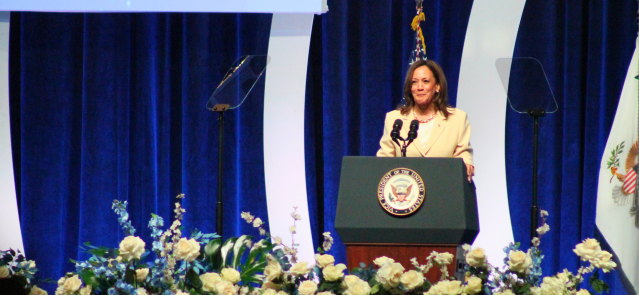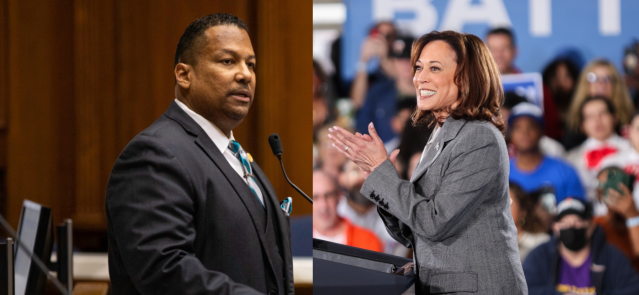Stay ahead of the curve as a political insider with deep policy analysis, daily briefings and policy-shaping tools.
Request a DemoAntisemitism bill heads to Gov. Holcomb’s desk

Speaker Todd Huston and Senate President Pro Tem Rodric Bray speak to media on Nov. 20, 2023. (Credit: Kaitlin Lange)
Lawmakers on Friday approved a bill that would define antisemitism in Indiana’s education code.
The bill at once would help the state’s education institutions deter antisemitism and serve as a symbolic message amid an ongoing war in Gaza, Republican leaders have said. House Speaker Todd Huston, R-Fishers, previously told reporters that lawmakers want to make sure they are “sending a strong message to our Jewish students across Indiana that we are supportive of them and we want them to have a safe experience on their college campuses.”
Both chambers approved the final version of the bill on the last day of the legislative session, sending it to Gov. Eric Holcomb’s desk for consideration.
House Bill 1002 codifies a working definition of antisemitism adopted by the International Holocaust Remembrance Alliance in 2016. The definition states antisemitism is “a certain perception of Jews, which may be expressed as hatred toward Jews. Rhetorical and physical manifestations of antisemitism are directed toward Jewish or non-Jewish individuals and/or their property, toward Jewish community institutions and religious facilities.”
Additionally, the bill says antisemitism, “whether expressed by an individual or through an institutional policy, is discrimination on the basis of race, creed, religion, or national origin.”
The compromise seemed to appease groups that were previously on opposing sides of the bill.
Caryl Auslander, spokesperson for the Indianapolis Jewish Community Relations Council, celebrated the possibility that Indiana would join “35 states, the federal government, 45 countries and over 1,200 institutions around the world” that have adopted the International Holocaust Remembrance Alliance’s definition.
The Indiana Muslim Advocacy Network said in a statement that it was pleased the bill would “protect our Hoosier Jewish communities without restricting freedom of speech.”
The road to compromise
Throughout the legislative session, the bill went through different iterations in the House and Senate, leaving the Jewish community and Palestinian Americans on opposing sides each time.
The primary cause: The International Holocaust Remembrance Alliance’s definition is tied to a list of 11 “contemporary examples” of antisemitism, such as “drawing comparisons of contemporary Israeli policy to that of the Nazis.” Some argued that the examples, if codified into law, would have infringed on free speech rights.
On Friday, the bill’s author, Rep. Chris Jeter, R-Fishers, acknowledged some of the examples were “problematic” for the bill’s purposes.
House lawmakers unanimously approved a version of the bill that would have included the examples and an attribution to the International Holocaust Remembrance Alliance. The decision pleased supporters in the Jewish community, but Palestinian Americans protested the vote, shouting, “Shame on you!” in unison outside the House chamber.
Appealing to the opposition’s worries, the Senate later removed the examples and the attribution from the bill, leaving the rest intact. In response, the Jewish community said the bill no longer went far enough.
The compromise reached Friday included an attribution to the International Holocaust Remembrance Alliance. But lawmakers decided not to include any mention of the examples.
Auslander said the Indianapolis Jewish Community Relations Council believes the controversial examples are still, however, incorporated into the bill because it references the International Holocaust Remembrance Alliance. Senate Minority Leader Greg Taylor, D-Indianapolis, dismissed the interpretation, saying the Legislature “did not adhere to a list of statements” and, instead, recognized “the importance of protection of everyone and every religion in the state of Indiana.”
In the lead-up to the end of the legislative session, it was unclear which provisions in the bill would prevail, as both Republican leaders — Huston and Senate President Pro Tem Rodric Bray, R-Martinsville — signaled support for their respective chamber’s version of the bill.
The bill was one of the House’s four priority bills this year. Lawmakers approved all of them, and they now await Holcomb’s decision.
Sen. Liz Brown, R-Fort Wayne, was the only legislator in either chamber to vote against the bill’s final version.
This story was updated to include a comment from Senate Minority Leader Greg Taylor.
Contact Jarred Meeks on X @jarredsmeeks or email him at [email protected].
X @StateAffairsIN
Facebook @stateaffairsin
Instagram @stateaffairsin
LinkedIn @stateaffairspro
4 things to know about Braun’s property tax proposal
Sen. Mike Braun, the Republican candidate for Indiana’s governor, released a plan for overhauling property taxes Friday morning that would impact millions of Hoosiers, Indiana schools and local governments. “Nothing is more important than ensuring Hoosiers can afford to live in their homes without being overburdened by rising property taxes driven by rapid inflation in …
Bureau of Motor Vehicles looks to add new rules to Indiana’s driving test
The Bureau of Motor Vehicles wants to amend Indiana’s driving skills test, putting “existing practice” into administrative rule. Indiana already fails drivers who speed, disobey traffic signals and don’t wear a seatbelt, among other violations. Yet the BMV is looking to make the state’s driving skills test more stringent. A proposed rule amendment looks to …
In Indianapolis, Harris says she’s fighting for America’s future
Vice President Kamala Harris, the presumptive Democratic presidential nominee, told a gathering of women of color in Indianapolis on Wednesday that she is fighting for America’s future. She contrasted her vision with another — one she said is “focused on the past.” “Across our nation, we are witnessing a full-on assault on hard-fought, hard-won freedoms …
Indiana Black Legislative Caucus endorses Harris, pledges future support
The Indiana Black Legislative Caucus unanimously voted Wednesday to endorse Vice President Kamala Harris’ presidential run and will look at ways to assist her candidacy, the caucus chair, state Rep. Earl Harris Jr., D-East Chicago, told State Affairs. The caucus is made up of 14 members of the Indiana General Assembly, all of whom are …




